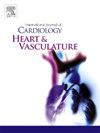Catheter ablation for persistent atrial fibrillation after acute decompensated heart failure Attack: Earlier is Better?
IF 2.5
Q2 CARDIAC & CARDIOVASCULAR SYSTEMS
引用次数: 0
Abstract
Background
Acute decompensated heart failure (ADHF) is often accompanied by persistent atrial fibrillation (AF). However, the optimal timing for RFCA in patients with persistent AF and ADHF is still uncertain.
Objectives
The aim of this observational cohort study is to investigate the safety and efficacy of early RFCA in patients with persistent AF after ADHF attack.
Methods
Patients with persistent AF and ADHF who underwent early RFCA as soon as the ADHF symptoms were initially controlled (Early group, n = 63) and those who received elective procedures after a transitional period (Elective group, n = 67) were investigated. After 1:1 propensity score matching, 50 matched pairs were analyzed.
Results
The overall procedural complication rates were similar (Early group: 6.0 %, n = 3; Elective group: 6.0 %, n = 3; P = 1.000). Patients in the early group had significantly less HF rehospitalization than the elective group during the 1-year post-procedure follow-up period (Mantel-Cox test: P = 0.036; HR: 0.369; 95 %CI: 0.145–0.938), though AF recurrence showed no difference (Mantel-Cox test: P = 0.645; HR: 1.204; 95 %CI: 0.547–2.648). A 90-day rehospitalization rate was significantly higher in the transitional period in the elective group, compared with patients who already received early RFCA (Elective group: 13, 26.0 %; Early group: 2, 4.0 %; P = 0.002).
Conclusions
Early RFCA therapy for persistent AF after ADHF attack was safe and effective. Patients who received early RFCA therapy had significantly less HF rehospitalization in the 1-year post-procedure follow-up period. On the other hand, the elective procedure was accompanied by a higher risk of HF rehospitalization during the waiting period.
急性失代偿性心力衰竭发作后持续性房颤的导管消融:越早越好?
背景:急性失代偿性心力衰竭(ADHF)常伴有持续性心房颤动(AF)。然而,对于持续性房颤和ADHF患者,RFCA的最佳时机仍不确定。目的:本观察性队列研究的目的是探讨ADHF发作后持续性房颤患者早期RFCA的安全性和有效性。方法研究在ADHF症状得到初步控制后立即进行早期RFCA治疗的持续性房颤和ADHF患者(早期组,n = 63)和在过渡期后接受择期手术治疗的患者(择期组,n = 67)。经1:1的倾向评分匹配后,对50对配对进行分析。结果两组手术并发症发生率相近(早期组:6.0%,n = 3;选修组:6.0%,n = 3;p = 1.000)。术后1年随访期间,早期组患者HF再住院率明显低于择期组(Mantel-Cox检验:P = 0.036;人力资源:0.369;95% CI: 0.145 ~ 0.938),但AF复发率无差异(Mantel-Cox检验:P = 0.645;人力资源:1.204;95% ci: 0.547-2.648)。与已经接受早期RFCA的患者相比,择期组90天再住院率显著高于择期组(择期组:13.6%,26.0%;早期组:2.4.0%;p = 0.002)。结论早期射频消融术治疗ADHF发作后持续性房颤安全有效。在术后1年随访期间,早期接受RFCA治疗的患者心衰再住院率显著降低。另一方面,选择性手术在等待期间伴有较高的心衰再住院风险。
本文章由计算机程序翻译,如有差异,请以英文原文为准。
求助全文
约1分钟内获得全文
求助全文
来源期刊

IJC Heart and Vasculature
Medicine-Cardiology and Cardiovascular Medicine
CiteScore
4.90
自引率
10.30%
发文量
216
审稿时长
56 days
期刊介绍:
IJC Heart & Vasculature is an online-only, open-access journal dedicated to publishing original articles and reviews (also Editorials and Letters to the Editor) which report on structural and functional cardiovascular pathology, with an emphasis on imaging and disease pathophysiology. Articles must be authentic, educational, clinically relevant, and original in their content and scientific approach. IJC Heart & Vasculature requires the highest standards of scientific integrity in order to promote reliable, reproducible and verifiable research findings. All authors are advised to consult the Principles of Ethical Publishing in the International Journal of Cardiology before submitting a manuscript. Submission of a manuscript to this journal gives the publisher the right to publish that paper if it is accepted. Manuscripts may be edited to improve clarity and expression.
 求助内容:
求助内容: 应助结果提醒方式:
应助结果提醒方式:


